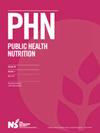Predicting Food Insecurity Among UK University Students During the COVID-19 Pandemic
IF 3
3区 医学
Q2 NUTRITION & DIETETICS
引用次数: 0
Abstract
Objective: The present study investigated potential predictors of food insecurity among UK university students during the COVID-19 pandemic. Design: Close-ended questionnaire administered to a cross-sectional sample of UK university students. Setting: Data were collected using an online survey platform in October 2020, during the COVID-19 pandemic. Participants: A nationally representative sample of UK university students (预测 COVID-19 大流行期间英国大学生的粮食不安全状况
研究目的本研究调查了 COVID-19 大流行期间英国大学生食品不安全的潜在预测因素。设计:对英国大学生横截面样本进行封闭式问卷调查。地点:英国在 2020 年 10 月 COVID-19 大流行期间通过在线调查平台收集数据。参与者:具有全国代表性的英国大学生样本(n=640)。研究结果从逻辑回归中得到的三个经济困难度量的几率比具有显著的统计学意义。首先,依赖学生贷款资助的学生报告粮食无保障的可能性是不依赖学生贷款资助的学生的 1.9 倍。其次,无法支付水电费的学生(与能够支付水电费的学生相比)处于食物无保障状态的几率是后者的 3.1 倍。最后,随着整个样本中认为支付住宿费困难程度的增加,食物无保障的几率也随之增加(OR= 1.9)。我们还发现,与近期未生病的学生相比,近期生病的学生陷入食物无保障的几率要高出 2.2 倍。我们没有发现任何证据表明,Covid-19 检测呈阳性可预测食物不安全状况,而大学提供的食品包/盒也没有减少学生的食物不安全状况。结论:在大流行病封锁期间,经济因素和疾病在高校学生自我报告的食物不安全中起着重要作用。需要进一步开展研究,探讨大流行病背景之外的食物不安全、经济因素和疾病问题。
本文章由计算机程序翻译,如有差异,请以英文原文为准。
求助全文
约1分钟内获得全文
求助全文
来源期刊

Public Health Nutrition
医学-公共卫生、环境卫生与职业卫生
CiteScore
6.10
自引率
6.20%
发文量
521
审稿时长
3 months
期刊介绍:
Public Health Nutrition provides an international peer-reviewed forum for the publication and dissemination of research and scholarship aimed at understanding the causes of, and approaches and solutions to nutrition-related public health achievements, situations and problems around the world. The journal publishes original and commissioned articles, commentaries and discussion papers for debate. The journal is of interest to epidemiologists and health promotion specialists interested in the role of nutrition in disease prevention; academics and those involved in fieldwork and the application of research to identify practical solutions to important public health problems.
 求助内容:
求助内容: 应助结果提醒方式:
应助结果提醒方式:


